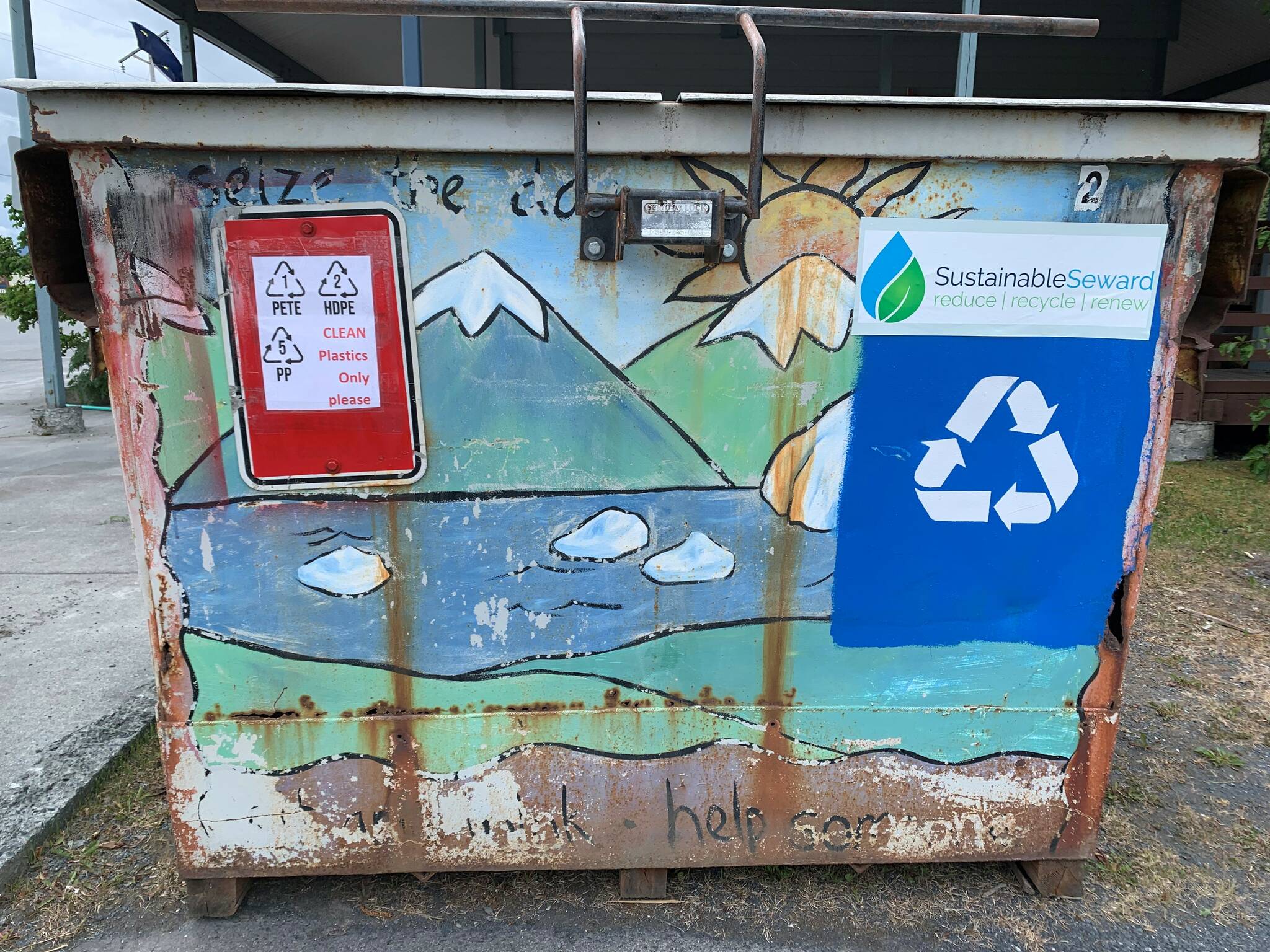Seward’s recycling infrastructure is expanding under a new program that will convert the city’s discarded plastic waste into artificial lumber.
Made possible by grant money awarded through the Environmental Protection Agency, the effort is led by Patrick Simpson with Alaska Plastics Recovery, with aid from multiple other groups, such as Sustainable Seward. That group, a local nonprofit formed in 2017, is spearheading recycling collection work in Seward.
Since May, Sustainable Seward Board of Directors Chair Lori Landstrom has been working with Simpson to harvest different types of plastic with the goal of turning the materials into recycled lumber. Even with bins the organization has scattered throughout the city, three repurposed dumpsters and the interception of plastic at the Seward Transfer Facility, Landstrom said Wednesday that she worries they aren’t catching all of the plastic.
“The point is to reduce the amount of plastic we consume (and) to reuse the plastics for anything else,” Landstrom said. “But if we can’t do either of those two, then at least attempt to recycle the item.”
Collection work will continue through the fall, when the raw materials will be processed into artificial lumber by Simpson. All of the plastics collected are being routed to the Seward Marine Industrial Complex in “super-sacks” to await processing. Super sacks weigh, on average, about 50 pounds each, Landstrom said.
In the fall, the accumulated plastic will be processed into recycled lumber that will be sold locally. To process the material, Alaska Plastics Recovery will bring in a mobile plastic recycling system, which will turn the material into 8-foot 2x2s, 2x4s, 2x6s and 4x4s. There’s already been some interest in local businesses, Landstrom said, in purchasing the lumber to block boats in dry dock.
In addition to the fleet of bins Landstom said has been distributed throughout the city, Seward’s Parks and Recreation Department has chipped in three small dumpsters for the effort. Those dumpsters, Landstrom said, were upscaled with help from the Alaska Vocational Technical Education Center and serve as a repo for #5 plastics.
According to Plastic Oceans International, a nonprofit organization with a goal of ending plastic pollution, there are seven kinds of plastics. #1 plastics, like water or soda bottles, and #2 plastics, like detergent bottles, are collected by the Kenai Peninsula Borough at its solid waste facilities.
Seward recyclers are particularly excited about the opportunity to recycle #5 plastics, Landstrom said, as yogurt containers fall under that category. Prescription bottles, like those dispensed at Safeway pharmacies, are also #5 plastics. That’s in addition to #4 plastics, which Landstrom described as being plastic films, and which Seward produces a lot of.
Falling under the #4 plastics category are things like opaque trash bags and, notably, shrink wrap. That includes the white shrink wrap that mariners frequently use to winterize their boats.
“Now we’re going to be able to recycle the hundreds and hundreds of yards of shrink wrap plastics that otherwise used to go into the dump,” Landstrom said.
For Landstrom, the economics of turning plastic into lumber are as attractive as its sustainability. The less plastic that ends up in Soldotna’s Central Peninsula Landfill, she said, the longer it takes for the landfill to fill up. It also costs money to build new landfill cells when the old ones fill up. Recycling, she said, addresses both issues.
“We’re going to prolong the lifespan of those line cells at the landfill,” Landstrom said. “As borough citizens and borough taxpayers, we’re going to save ourselves some money.”
Sustainable Seward’s plastics receptacles can be found at the Seward harbor, as well as at the Seward Chamber of Commerce, the Seward Senior Center and at the intersections of 3rd and 4th avenues and Washington and Adams streets. All #1 and #2 plastics collected at the Seward Transfer Facility will also be collected by the project.
Sustainable Seward is a nonprofit organization founded in 2017 with a stated mission of raising awareness and implementing solutions for waste reduction in the Seward Area. Alaska Plastics Recovery operates under PKS Consulting and is funded by the Environmental Protection Agency.
More information about Sustainable Seward can be found on the group’s website at sustainableseward.org.
Reach reporter Ashlyn O’Hara at ashlyn.ohara@peninsulaclarion.com.

